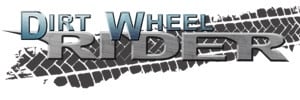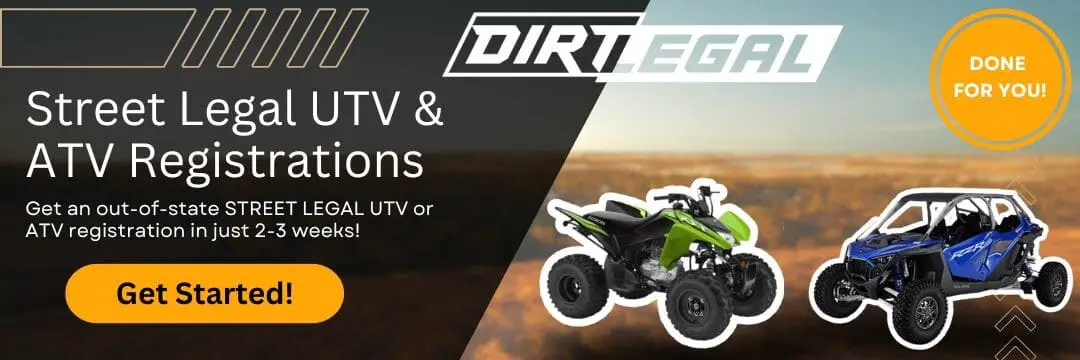Table of Contents
In this article, we will explain what you need to know about the street-legal law on ATVs and UTVs in the state of Washington. If you’re an off-road enthusiast, you might be wondering where and how you can ride your ATV or UTV legally on public roads in Washington. You’re in luck because Washington has one of the most ATV-friendly laws in the country. Before you hit the road, here are some things you need to know and do.
- Is there any law in Washington that allows for ATVs or UTVs to be street legal?
- How does Washington’s law formally classify an ATV or UTV?
- Can an ATV or UTV be street-legal in Washington?
- What are the requirements to make an ATV or UTV street-legal?
- What are the operational and safety requirements when driving a street-legal ATV or UTV in Washington?
- Where can I drive my street-legal ATV or UTV in Washington?
- I am not a resident of Washington; can I still register my vehicle in this state?
Washington Legal Classification of ATVs and UTVs
In the state of Washington, ATVs and UTVs are legally classified as “wheeled all-terrain vehicles.” The definition of this term according to the state law encompasses the most common characteristics of ATVs and UTVs. Let’s explore this below.
ATV: Wheeled all-terrain vehicle
In Washington Law, a wheeled all-terrain vehicle means any motorized nonhighway vehicle with handlebars that is fifty inches or less in width, has a seat height of at least 20 inches, weighs less than 1,500 pounds, and has 4 tires with diameters of 30 inches or less.
UTV: Wheeled all-terrain vehicle
A wheeled all-terrain vehicle also means a utility-type vehicle designed for, and capable of, travel over designated roads that has 4 or more low-pressure tires of 20 PSI or less, and is less than 74 inches wide, weighs less than 2,000 pounds, has a wheelbase of 110 inches or less, and meets any of the following: at least 50 inches wide, weighs at least 900 pounds, and a wheelbase of over 61 inches.
Now, the most obvious giveaway in these definitions is that the wheeled all-terrain vehicle can be a motorized nonhighway vehicle with handlebars, which points to an ATV, and the second provision which is that it can be a utility-type vehicle, or simply a UTV.
Can an ATV or UTV be street-legal in Washington?
Yes, an ATV or UTV, or in this case, a WATV may be registered as street-legal in the state of Washington. This can be done by first modifying the vehicle to meet the equipment requirements for public road use prior to registration.
ATVs: What are the requirements to make an ATV street-legal in Washington?
In order to register your ATV for on-road use in the state of Washington, you must comply with the requirements below. Do note that your ATV must be modified beforehand prior to applying for registration.
1. Paperwork
- Manufacturer’s Certificate of Origin
- Certificate of Title
- Safety Inspection Certificate
- VIN
- License plate
2. Parts
- Head lamps
- Tail lamps
- (at least one)
- Stop lamps
- Reflectors
- Turn signals
- Brakes
- Mirror
- (on left or right handlebar)
- Horn or warning device
- Spark arrester and muffling device
- Windshield
- (unless the operator wears glasses, goggles or a face shield that meets the requirements by the state patrol)
UTVs: What are the requirements to make a UTV street-legal in Washington?
For a UTV to be registered for on-road use in the state of Washington, it must comply with the requirements below. It is important to note that your UTV must be modified with the required parts first before registering the vehicle.
1. Paperwork
- Manufacturer’s Certificate of Origin
- Certificate of Title
- Safety Inspection Certificate
- VIN
- License plate
2. Parts
- Head lamps
- Tail lamps
- (must have two)
- Stop lamps
- Reflectors
- Turn signals
- Brakes
- Mirror
- (must have two)
- Horn or warning device
- Spark arrester and muffling device
- Windshield
- (unless the operator wears glasses, goggles or a face shield that meets the requirements by the state patrol)
- Seatbelts
What are the operational and safety requirements when driving a street-legal ATV or UTV in Washington?
When driving an ATV or UTV on public roads in Washington, you are required to adhere to the following operational and safety requirements:
- Driver’s License
- A motorcycle endorsement is not required.
- For operators under the age of 16, they must be supervised by another person who is over 18 years old and with a valid driver’s license.
- Insurance
- Helmets
- Riders under the age of 18 are required to wear USDOT-approved helmets whenever they are on public roads or highways in this state.
- Eye protection (in the absence of a windshield)
- Vehicle capacity
- Unless the vehicle is designed for more than one rider or another seat has been firmly attached to the rear or side, the operator may not carry a passenger.
Where can I drive my street-legal ATV, UTV or other WATV in Washington?
In the state of Washington, the ability to operate your ATV or UTV is very limited. Generally, an ATV or UTV or WATV may be only be operated on public roads with a speed limit of 35 miles per hour or less. That means, if your route involves crossing a street with speed limits higher than 35 miles an hour, you may not be allowed to cross it. However, the silver-lining here is that counties, cities, or towns are given the authority to designate roadways within their jurisdictions that would allow for the operation of these vehicles. With that, it is highly recommended that you check local regulations if you plan on taking your WATVs to the streets.
If my ATV or UTV is registered as “street legal” in Washington, can I drive it on the roadways in other states?
Yes, you can! Many states honor “Registration Reciprocity” meaning that even if a vehicle cannot be registered in their state, they will accept another state’s registration as valid.
Please note though that this is a state-by-state situation as each state has different laws so it’s not possible to give blanket advice here. That said, drivers of OHVs in Washington can generally ride their registered OHV on the roadways in other states too so long as those states accept the Washington registration via reciprocal agreement.
I am not a resident of Washington; can I still register my vehicle in this state?
Maybe? The state of Washington has not provided any guidance on this topic so we recommend checking with the Washington Department of Licensing for more accurate and up-to-date information.
Out-of-state registration of UTVs and ATVs is a detailed and nuanced topic though, and requires more specific advisement to your individual situation than we can provide in this article. As such, we have partnered with Dirtlegal.com. DirtLegal.com helps drivers to register their ATVs and UTVs in “street legal” states, so that they can be driven on roadways in other states that honor Registration Reciprocity.
Get STREET LEGAL with DirtLegal.com
Conclusion
Washington is one of only a few states that have allowed to legally register ATVs and UTVs for street use. Although we have now also learned that in this state, the opportunity to actually operate your street-legal ATV or UTV is very minimal due to numerous restrictions. So if you are still undecided whether or not to modify your ATV or UTV to be registered as street-legal in this state, keep those limitations in mind. But if you are planning to take your street-legal vehicle out-of-state, then getting your ATV or UTV registered as street-legal in Washington might just be worth it.
While this article has provided a comprehensive overview of the street-legal laws on ATVs and UTVs in this state, it is important that you consult your local DMV for more specific and accurate information regarding ATV and UTV regulations. Because state laws can change over time and regulations differ between jurisdictions, relying solely on the information presented here may not provide the most up-to-date or region-specific details. Remember that street-legality is determined by state and local laws, and it is your responsibility as an ATV or UTV owner to ensure that you are operating your vehicle within the legal boundaries.
Helpful Resources:



